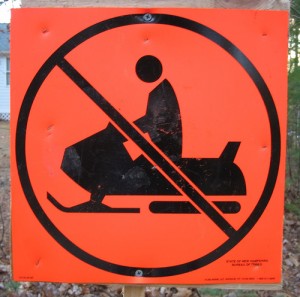
A new study says snowmobilers have economic impact on the state as a ban is considered on their activity in Michigan. Photo: jparise via Flickr.
By PAIGE LaBARGE
LANSING–A Michigan State University research study has handed ammunition to opponents of a proposal to ban firearm hunting and snowmobiling in parts of the vast Huron-Manistee National Forest.
It is a 2009 study by forestry Professor Chuck Nelson on the impact of snowmobiling activities in the state.
“We did this regionally and we found that snowmobilers in Michigan and tourists bring in a considerable amount of economic impact to the state,” Nelson said.
The forest covers about 1 million acres between lakes Huron and Michigan in the northern Lower Peninsula.
The study is drawing attention as the U.S. Forest Service considers banning snowmobiling and firearm hunting in nearly 70,000 acres of the forest.
The potential federal action results from a U.S. Court Appeals order in a lawsuit by Novi attorney Kurt Meister, who claims those areas should be designated for quiet recreation.
Nelson surveyed a sample of 3,000 snowmobilers who were 78 percent Michigan residents.
“We looked at how many days were used for snowmobiling in the winter of 2007-08, and we also found that spending related to snowmobiling was $239 million for snowmobile trips and $173 million for snowmobile equipment for 2008-09,” Nelson said.
Nelson said the economy gained $156 million from travel spending and $98 million from equipment spending.
“For tourists, the gas and traveling involved to get to these trails and hotels also generates revenue for Michigan’s economy,” Nelson said. “Overall, we found this recreational activity to be beneficial to Michigan.”
Nelson also studied how many people take part in outdoor activities and found hunting to be the No.1 use of outdoor experience for both tourists and residents.
The House has passed a resolution opposed to the proposed ban for the national forest.
The House Natural Resources, Tourism and Outdoor Recreation Committee discussed the effects on the economy if the ban is imposed.
“Hunters bring in overall revenue to the state and improve economy by traveling and participating in the outdoor experiences the state offers,” Rep. Peter Pettalia, R-Presque Isle, said.
And Rep. Bruce Rendon, R-Lake City, said that in- and out-of-state hunters bring in $28 million.
Bill Mason, executive director of the Michigan Snowmobile Association, cited Nelson’s study and said the forest offers 600 miles of trails, including 13 non-motorized areas that have seven trails.
He said it would damage the economy if they are closed.
“Travel and tourism in Michigan are dependent upon forests like this and closing some of the trails would make it harder to rebuild in the future, if we ever had to,” Mason said at the committee meeting.
Mason referred to Nelson’s study, saying that Michigan has more registered snowmobilers than any other state and that outdoor activities are a necessity for a better economy.
Jane Cliff, public affairs specialist at the Forest Service in the Eastern Region, said that anytime a large proposal is brought up, it has to go through a major analysis.
“The committee meetings are being held because everyone needs to discuss the topic and find what’s best for the state,” said Cliff, who is based in Cadillac. “This is part of the ongoing analysis process, and we have to look at all the evidence presented in order to make a correct decision.”
© 2011, Capital News Service, Michigan State University School of Journalism. Not to be reproduced without permission.
